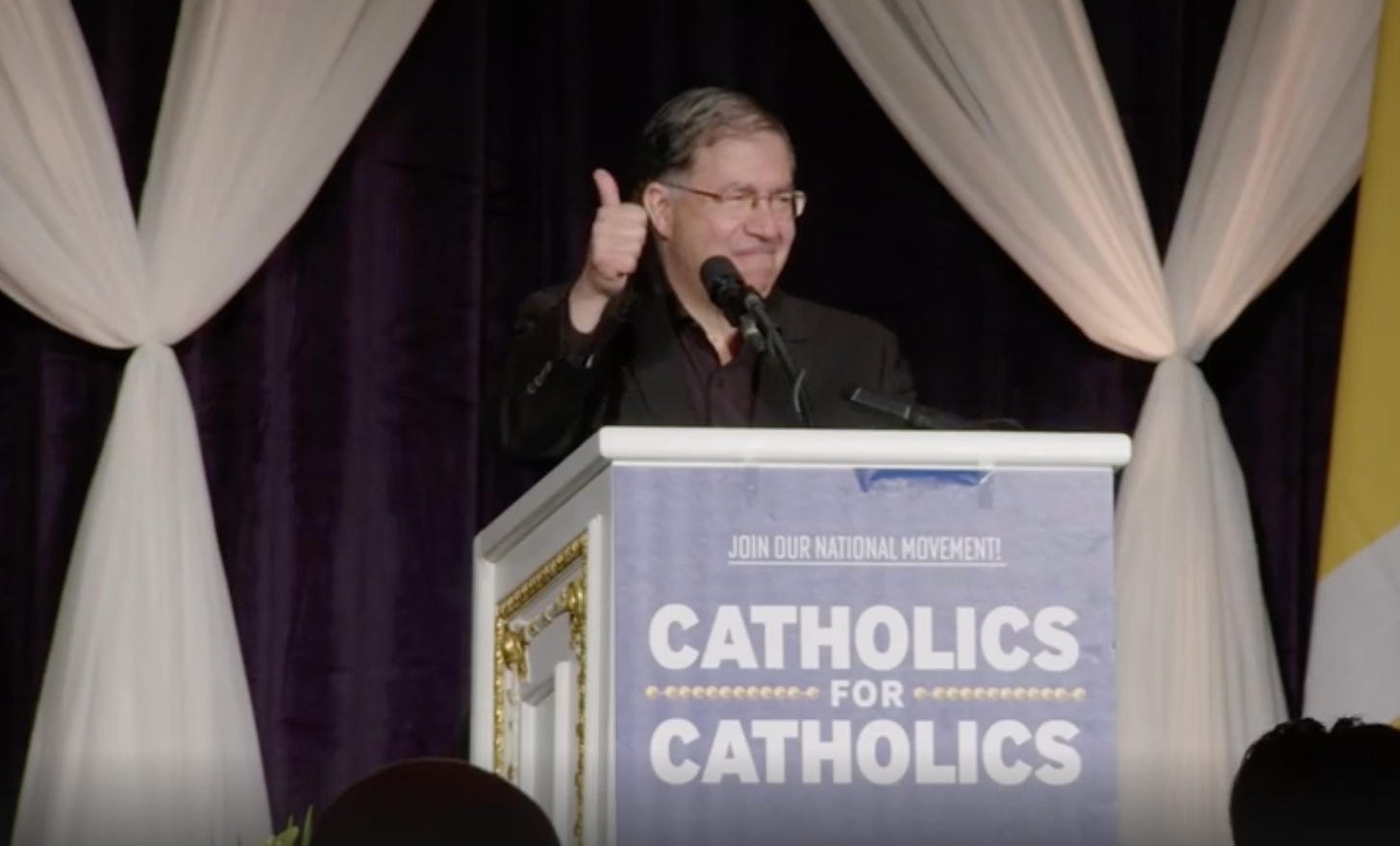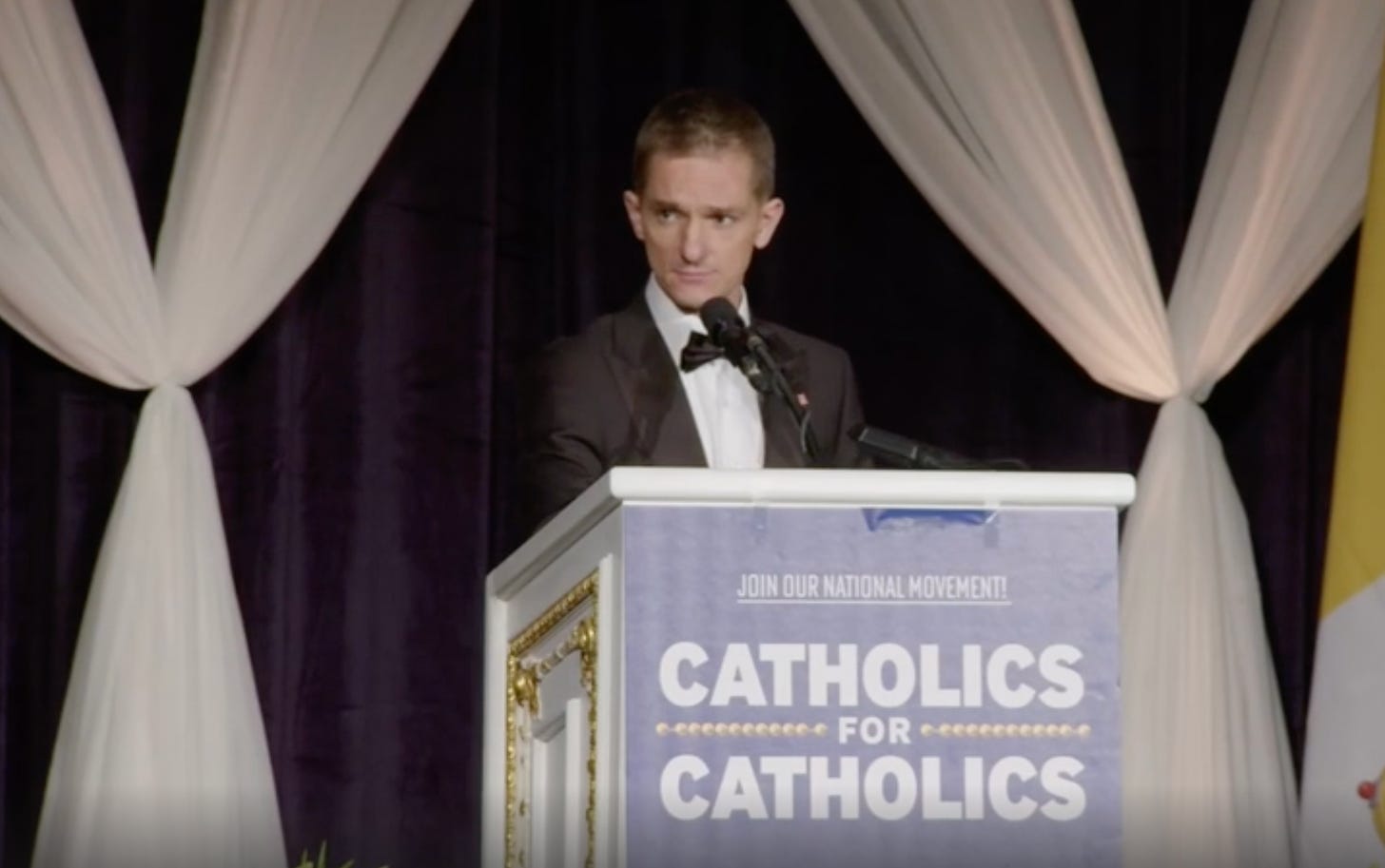
Eucharistic Congress cautioned speaker over ‘Catholic Prayer for Trump’ event
In a divided political climate, the Eucharistic Congress aims to stay above the fray
The Eucharistic Congress cautioned a scheduled speaker this week about participating in a political prayer event, organized by a group barred from calling itself Catholic by local bishops.
The move signals that Eucharistic Congress organizers — among them several bishops — are keen to see the spiritual event avoid becoming entangled in partisan division, especially as the event will take place just months before a national election sure to be fractious among Catholics.
According to sources close to the Congress, organizers expressed concern privately last week that chastity speaker Jason Evert, who is scheduled to offer a breakout session at the national Eucharistic Congress to be held in Indianapolis this July, was scheduled to speak at a March 19 event held at Donald Trump’s Mar-a-Lago resort, organized by the controversial group “Catholics for Catholics.”
Evert, who declined comment to The Pillar and did not attend the Mar-a-Lago event, was reportedly encouraged by Congress officials to reconsider his attendance, with his scheduled appearance prompting a plan for the Congress to issue guidelines for all scheduled Congress speakers about political activity ahead of the July event.
The speaker’s scheduled Mar-a-Lago appearance had become the subject of criticism online, which, according to one source, gave Congress organizers concern— both about the specific situation, and about the broader prospect of politically charged perceptions ahead of Eucharistic Congress.
One source close to the Congress told The Pillar that while Evert was not expected to give an overtly political speech at the Trump event, his scheduled presence caused concern internally that the Eucharistic Congress would face backlash.
The Eucharistic Congress did not directly answer questions from The Pillar regarding Evert’s withdrawal from the Catholics for Catholics event.
Instead, a statement from organizers told The Pillar that: “The National Eucharistic Congress is a catechetical and evangelistic event for all Catholics. The Congress and Pilgrimage are solely focused on deepening an encounter with Christ in the Eucharist and are independent of political and ideological agendas.”
A spokesperson for the Eucharistic Congress acknowledged that organizers have been concerned about the prospect of seeing their events affiliated with political agendas.
“We are very much trying to keep the Congress completely away from politics,” spokesperson Kate Sell told The Pillar Thursday.
“This is not a Catholic convention — It is a Eucharistic Congress. And the pilgrimage is not a march — it is a Eucharistic pilgrimage. It is extremely important to the Congress, and to the bishops, that, especially during this election year, we do everything we can to keep the focus on Jesus Christ.”
Sell said that when Catholics join the national Eucharistic pilgrimages, “we’re not going to allow any [political] signage or political messaging,” because “the focus is Jesus.”
“Everything must be focused on Christ who belongs to the world,” she said.
“It’s vitally important that this pilgrimage is an encounter with Christ to anybody who walks in. If they’re gay, if they’re an immigrant, if they’re a white suburbanite. Jesus belongs to everybody, and that’s the focus.”
But Sell acknowledged the challenge of attempting to keep distance from politics in a politically charged American culture.
“It’s difficult because the Congress itself is even during the Republican National Convention — so politics will be on people’s minds. But we’re ensuring that politics and individual political slants are not going to be part of anyone’s programming or talks.”
—

The March 19 Mar-a-Lago event, “Catholic Prayer for Trump,” was attended by some 1,000 Catholics, and featured several Trump-affiliated Catholics figures, among them laicized priest Frank Pavone, activist Jack Posebeic, and former advisor Roger Stone, who was pardoned by Trump in 2020, after a 2019 conviction for witness tampering and making false statements.
The even has sparked criticism online, especially after Posobiec referred in his speech to “cultural marxists” as “the un-humans.”
Also billed at the event were actor Jim Caviezel and Tim Ballard, the subject of a 2023 biopic, who was once praised for efforts to combat human trafficking, and has been more recently fired by the anti-trafficking organization he once led, censured by the Mormon church, and now faces numerous allegations of sexual assault, which he denies.
Event organizer Catholics for Catholics describes itself as a 501c4 organization which “provides educational resources about Catholic doctrine, including materials addressing Catholic leaders’ positions on public policy, legislation, and other social welfare matters.”
The group says its priority is “hold[ing] our elected leaders accountable to the Constitution and, in a special way, to those politicians who refer to themselves as Catholic.”
“The deafening silence of Church leaders, who are the first ones tasked with guarding the truths of our Faith, has made it all the more urgent that we stand up now and hold the line,” the Catholics for Catholics website says.
While the rally was organized in response to the Los Angeles Dodgers honoring of an anti-Catholic group, the Sisters of Perpetual Indulgence, the archdiocese encouraged Catholics to attend a Mass held in the city’s cathedral instead.
The group reportedly clashed in 2022 with bishops in its home state of Arizona.
John Yep, the group’s executive director, told LifeSiteNews last year that Arizona’s bishops had “come after us” over the group’s use of the term “Catholic” — apparently directing Catholics for Catholics to refrain from calling itself a Catholic organization, in accord with canon 216 of the Code of Canon Law.
But Yep said his group had obtained canonical representation to fight that directive.
LifeSiteNews pointed to a statement from the Arizona Catholic Conference which clarified that organizations must obtain ecclesiastical permission before identifying themselves as Catholic. Though the statement did not explicitly mention Catholics for Catholics, Yep told LifeSiteNews that the statement was intended to address his group.
Apart from Yep, it is not clear which Catholics serve as board members or staffers of Catholics for Catholics. While the website has an “about” section with a “meet the Catholics for Catholics team” heading, the page does not list any individuals as formally affiliated with or working for the organization.
The Mar-a-Lago event came just two days after President Joseph Biden held a St. Patrick’s Day breakfast event at the White House for “Catholic leaders.”
U.S. apostolic nuncio Cardinal Christophe Pierre was present, along with USCCB officials and an invited list of Catholics, several of whom have been criticized for controversial stances on Catholic teaching, among them Fr. James Martin, Democratic activist John Gehring, the presidents of Georgetown and Fordham University, and journalist Fr. Tom Reese, SJ.
The dueling events point to the deepening chasm among Catholics over the 2024 presidential election — a rift which the Eucharistic Congress says it does not wish to fall into.
But one source close to the Congress told The Pillar that criticism over perceived political agendas seems inevitable in the months to come — and expressed concern that efforts to see speakers disengage could invite more controversy.
“Catholics are going to pay attention to it. And if you try too hard to control what all the speakers are doing, it could just end up drawing more attention to every single political thing that any speaker or person working for the Congress does,” the source told The Pillar.
“And you don’t want to empower every single possible online critic to just scrutinize every little thing. So I think the Congress still has to figure out what the actual guidance really should be, and what the line is going to be.”
The U.S. bishops themselves have also been sharply divided over politics in recent years, with bishops split over their political guidelines, engaged in 2021 for months in an unusually public debate over questions related to the Eucharist and pro-abortion politicians, and with a series of political maneuvers among bishops concerning a USCCB statement on Biden’s inauguration day.







« Evert, who is scheduled to offer a breakout session at the national Eucharistic Congress to be held in Indianapolis this July »
Are any of those attending the St. Patrick’s Day breakfast event also scheduled to participate in such a public way the the Eucharistic Congress as Mr. Evert? If so, were they similarly cautioned (or was such a caution possible in advance)?
The episcopate and the USCCB have invited and unintentionally stoked this controversy. For decades, they have failed to catechize generations of American Catholics. They have repeatedly turned a blind eye to the positions espoused (a term I use VERY deliberately!) by nominally Catholic politicians--repeatedly failing to call out their egregious policy positions. (Trivia question: who was the last politician excommunicated for pushing policies directly contradicting Church teaching?) And they have repeatedly failed to sanction nominally Catholic institutions (e.g., Notre Dame and Jesuit-run universities) for promoting anti-Catholic positions--often under the false flag of "academic freedom." Most of the bishops have stood by idly as the cultural Marxists and their Sexual Revolution allies have captured their chanceries and corrupted the Church. Of course, the most glaring and diabolical manifestation has been the sexual abuse scandals. Sure, they defrocked and defenestrated Ted McCarrick but Msgr. Burrill remains in good standing, as does James Martin, SJ.
Conversely, orthodox priests and bishops find themselves quickly ostracized. The pusillanimity of many bishops--and their shameful desire to quickly make peace with the world and anti-Catholic ideas--is deeply disturbing and unworthy of successors to the Apostles. The politicization of the Eucharistic Congress is an inevitable consequence of the weakness of the U.S. bishops.